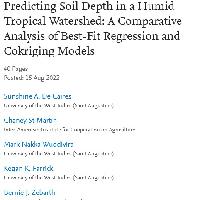Resumen
-
Spatial variation in soil depth, a critical parameter in hydrological studies, is often predicted using ordinary least squares (OLS) regression. However, environmental data generally violates the assumptions for OLS application making it challenging to accurately predict soil depth in rugged humid tropical environments. This study determined the best-fit assumption-based (i.e., OLS) and assumption-relaxed (partial least squared, quantile, and elastic net) regression models, and compared them with a cokriging model, for predicting soil depth in a 50 x 150 m humid tropical watershed. Soil depth, apparent electrical soil conductivity (ECa) at two depths of exploration (ECas, 0 – 0.5 m and ECad, 0 – 1.6 m using a DUALEM-1S EC meter), and soil physical and chemical properties measured in-field or using soil samples (0 - 0.2 m), were determined at each sampling location. Multivariate regression models explained 86 – 89% of the variability in soil depth and had a comparative root mean square error and prediction rate error to corresponding univariate models. ECad was a significant predictor in all models except the elastic net regression model. The cokriged model was superior to all regression models with the lowest RSME (0.06) and PER (10%) and can be used to improve soil depth predictions across the rugged humid tropical watershed, thereby improving hydroecological models for climate change studies in this vulnerable humid tropical watershed. Most interestingly, our results suggest that OLS models are robust enough to handle some violations of their assumptions implying that data transformation may not always be required for OLS regression. Therefore, it is recommended that the traditional workflow for OLS regression include a validation check using an assumption-relaxed model, the outcome of which would determine the necessity of data transformation.
